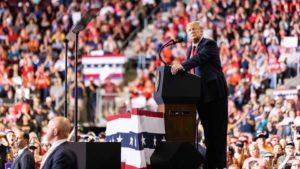By Recker McDowell —
Arizona is going to be a top election battleground not only for President Donald Trump’s bid for a second term in November but also in the Democratic presidential race.
Former New York City mayor Michael Bloomberg and U.S. Sen. Elizabeth Warren (D-Massachusetts) are already setting up beachheads in Arizona for the March Democratic primary.
There will be significant national attention and advertising for the presidential race as well as the U.S. Senate race between Republican Martha McSally and Democrat Mark Kelly. Metro Phoenix will be a national battleground akin to Orlando, Tampa and the suburbs of Philadelphia, Detroit and Milwaukee.
The wave of ads may tire out Phoenix television viewers and Facebook users. But the national political wave will also impact state and local races throughout the Valley and the rest of Arizona.
Democrats are of course hoping for an anti-Trump wave spurred by turnout of younger voters, Latinos, progressives and other constituencies.
If that happens, it could help progressives and moderate Democrats in local and state races. That would piggyback on Democrats success in the 2018 midterm elections.
Democratic success in down-ticket races could impact state and local policies related to growth, economic development, health care, water and education.
Progressive promises related to health care and education are already centerpieces of Democratic presidential efforts (especially Warren and U.S. Sen. Bernie Sanders).
Of course, Democratic turnout hopes did not materialize in 2016 with Trump carrying Arizona, Florida and Rust Belt battlegrounds.
Trump supporters are hoping the strong economy and stock market and the President’s ability to rally his populist base will again carry the day.
A challenge for state and local Republican candidates is how much they follow Trump’s rhetoric and attacks on the media and Democrats.
Following the Trump path will endear other Republicans to the base but could turn off moderates especially in Arizona where the late John McCain and the retired Jeff Flake (both Trump critics) still have constituencies.
The flip side for GOP candidates is that if they resist Trump, they risk alienating the base and ending up on the outs (much like Jeff Flake).
The Trump takeover of the GOP can also mean more populist candidates, and potential office holders at the state and local level. That could mean a change in Republican approaches to trade, taxes and social issues with a less focus on the business lobby and a more populist tint.
Either way, Arizona is in for a lot attention, a lot of advertising and campaign stops and some potential major changes to its political landscape.

